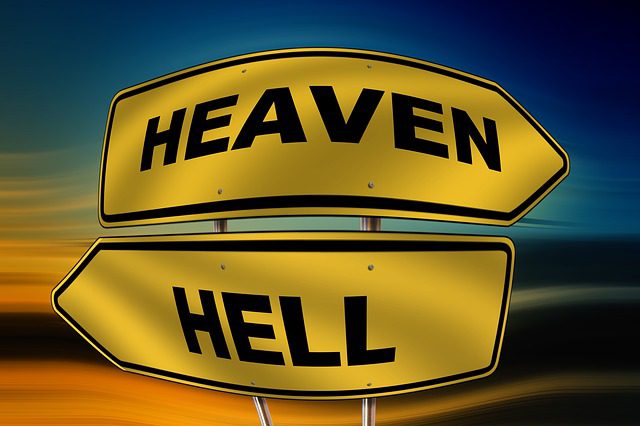
A charge often leveled against universalists is that there is no room for justice. The so-called bad guys die and then waltz right into heaven. No need for repentance. No need to reconcile with those they’ve harmed. Nothing. Even Hitler, humanity’s persona non grata, gets a pass.
Well, not so fast.
This is the perpetual strawman infernalists and annihilationists both use to dismiss the universalist position.
Now, it may be true that in some corner of the globe there exists a proponent of universal reconciliation who argues these things, but that is not the norm. Instead, what most universalists argue is that while everyone is saved, everyone also experiences hell.
Here’s what I mean.
Take a look at Mark 9:42-50, a favorite text of the infernalist. In this passage, Jesus says some really harsh things, the most shocking being that those who cause “little ones” to stumble would be better off tossed into the sea with a millstone around their necks (reminds me of something out of a mafia movie). Then he gets into all the hell stuff, warning that it’s better to be maimed then end up in Gehenna.
Open and shut case, right? Some people are going to end up in eternal hell.
Wrong.
There are two problems with concluding that. First, at the time of Jesus saying this, Gehenna wasn’t necessarily thought of as a place of eternal torment. During the intertestamental period, there were some Jews who adopted a belief that it represented afterlife punishment (lasting somewhere between 12 and 18 months), but we can’t be sure that that’s what Jesus means here. And even if he did, he seems to subvert it just a few verses later.
Mark 9:49-50 reads:
For everyone will be salted with fire. Salt is good; but if salt has lost its saltiness, how can you season it? Have salt in yourselves, and be at peace with one another.
Did you catch that? Everyone enters the fire. Not just the baddies. Not just non-believers. Not just the people you don’t like. Everyone. You. Me. Everyone who loves. Everyone who hates. Everyone.
But Jesus doesn’t stop there. He then goes on to say that the fire is good. The fire leads to salt and as we all know, properly salted food is absolutely delicious. Without it, the food is bland.
Then, Jesus wraps everything up with a nice bow: Be at peace with one another. The whole context of this passage is living a peaceful life with one another because if we don’t, we will end up in Gehenna. And guess what? They do end up in Gehenna when Rome decides to lay waste to Jerusalem in 70 CE. But more than that; those of us who aren’t at peace with one another, who don’t welcome the fire that burns away our contempt, hatred, malice, envy, strife, end up in little Gehennas all throughout our life.
The same themes are later confirmed by Paul in 1 Corinthians 3:12-15, which read:
Now if anyone builds on the foundation with gold, silver, precious stones, wood, hay, straw – the work of each builder will become visible, for the Day will disclose it, because it will be revealed with fire, and the fire will test what sort of work each has done. If what has been built on the foundation survives, the builder will receive a reward. If the work is burned up, the builder will suffer loss; the builder will be saved, but only as through fire.
Now, I personally wouldn’t literalize too much of this. I’d be really wary to view Paul’s words as “do good things for Jesus so that you get a prize when you die” sort of statement. But the point still remains: Everyone, while saved, is tested by fire. All the goodness in them is preserved (perhaps in the same way salt preserves meat) while all the crap is burned away. Paul calls it wood, hay, and straw. Others may call it contempt, hatred, malice, envy, and strife. But whatever words we use, it seems the point is clear: We are all saved, yet we all pass through the fire.
Of course, at the end of the day, you may disagree with my interpretation of these two texts. That is fine. Disagreements are healthy. The point in writing this entry is not to convince you of anything; the point is to clarify for those who think universalists don’t include justice in their eschatology. There is always room for justice. In fact, I would argue that love demands it. It may not look like humanity’s version of justice (in fact, it doesn’t). But justice is always included.
The fire of God is a consuming fire. Not an eternally tormenting fire. And not an annihilating fire. But a fire that consumes all the bad within us so that we live as we were truly meant to live – at peace with one another and God. That is heaven, but we all need to experience a sort of hell to get there.
Peace.
If you wanna get to know me better, please follow me on social media. I’m pretty active on all platforms:
Also, if you’ve been digging my work on here, and want to see me be able to continue writing as close to full-time as humanly possible, please take a look at my Patreon page at www.patreon.com/mjdistefano. Even $1 a month helps bigly!!!














